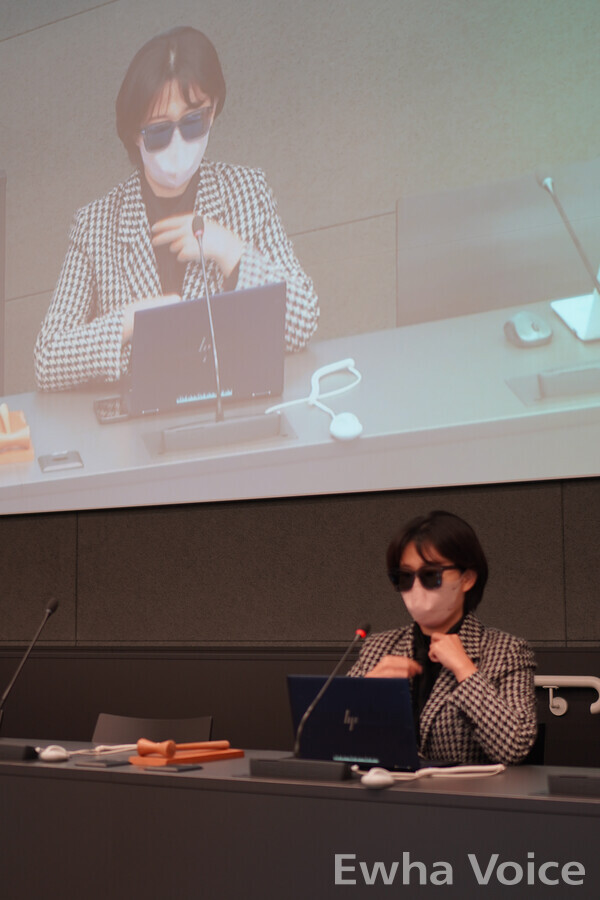
A short hair campaign encouraging women with short hair to post pictures of themselves is ongoing nationwide, following a late-night attack by a man on a female shop clerk on Nov. 4. The peculiar reason for the attack, which the offender thought of her as a feminist based on her short hairstyle and deemed her reprehensible, has invoked the ire of South Korea and put the campaign back on track in two years.
The campaign was first stirred to action in 2021 to defend an Olympic gold medalist An San, when she received abuse online for having short hair and studying in a women’s university.
Since after the incident, thousands of women began posting pictures of themselves with short hair against the “feminism backlash.” As of Nov. 6, more than 7,000 posts with the hashtag “#women_ shortcut_campaign” were on social media.
Eun-na, one of the participants of the campaign, has also shown a great sense of solidarity through uploading her photo on Instagram. She is currently working as a content PM in the field of media art called “Art culture for you,” creating various contents that attract people to art.
In July 2021, Eun-na first participated in the campaign by posting a photo of herself with short hair on Instagram to counter the cyber-bullying against An San. When the violent incident occurred this November, she uploaded another photo on Instagram again.
“Every time I witnessed physical or verbal abuse against women with short hair, I thought it could always happen to me and my female friends,” she said.
Professor Shin Gyeong-a from the Department of Sociology at Hallym University highlighted the great significance of the campaign, not only for supporting the victim but for spreading female solidarity awareness and verifying the incident happened on Nov. 4 as a serious crime.
Professor Shin expressed her gratitude as a woman in the older generation toward the younger generation for provoking a social change.
“The Supreme Prosecutor’s Office finally defined the incident as a misogyny crime,” she said. “I believe the recent challenge seemed to work. To fight back against repugnance and discrimination, group consciousness and will is immensely important, and Korean women are getting on very well today.”
Professor Shin explained that antifeminism and hatred for women is a sort of cultural code that has been inherent due to the long history of patriarchal society. While society is trying to rectify those codes, she regarded the incident as a backlash led by few men with low gender sensitivity.
Although short hairstyles have become more common among women than before, Eun-na revealed it does not seem to be a society where freedom of choice is encouraged and allowed yet. She felt the hairstyle that women should adhere to was implicitly set in society, and that there are still many people in the world who want to stigmatize women who deviate from it.
What she wants most is a society where women can live safely. For such a society to come, Eun- na stressed that every member of society should be wary of defining and evaluating women, and that women are not subject to violence for any reason, whether they have short hair or not.
“We all need to know how absurd and ridiculous the ‘femininity’ some imagine and expect is,” she said. “I hope that more people will realize how violent judging women based on their hair length, clothes, makeup, and body appearance is, and that these sorts of campaigns will help move on to a society where all women could live safely.”
To stop this sort of case from reoccurring, Professor Shin suggested both legal and societal efforts. As for the legal level, she emphasized the need for enacting laws including the Anti- Discrimination Act, which has never been passed since its motion. Furthermore, she believes vigorous discussion about its perils, pugnacity, and injustice must be continued in the center of the public sphere when such crimes occur.
Prior to the recent flow of social movement towards gender equality, Team Flame, an activist group for women’s rights in South Korea has been tackling gender issues since 2019. Their first team investigation was on the Nth room case, a cyber sexual exploitation crime that shook South Korea. Their lead in active reporting of the crime eliminated social prejudice against female victims and paved the way in searching for blind spots in the gender imbalance of South Korea.
Won Eun ji, founder of Team Flame and current editor of Alookso, a media platform for public discussion, wrote an article titled “If every woman on the streets was short haired,” discussing the short hair campaign that inspired women to voice their opinions on gender discrimination rooted deeply in society. In her article, Won pointed out that though it is devastating to see how the strongest protest a woman could make in South Korea is to cut her hair short, she strongly endorses the outgoing protests by women. The short hair campaign is estimated to crack the black-and-white logics of men who believe short haired women to be radical feminists. She further explained that the ongoing campaign could be seen as a subversive bodily action where women reverse the traditional gender image of having long hair to regain their rights.
“The short hair campaign is significant in sharing similar experiences of discrimination and self-consciousness each woman had after cutting their hair short,” Won said.
Though the campaign contributed to interdependence amongst women, the collective action on women’s rights would not last if there are no permanent efforts initiated by the South Korean government. According to Won, the government has been cutting down on budgets previously reserved for female victim support centers.
“If the government does not prioritize women’s rights, misogyny will prevail in society,” Won said. “I strive for an ideal world where women live without fear of becoming victims of crime because of their looks and ideals.”

